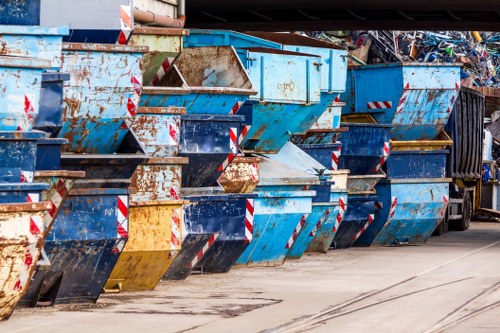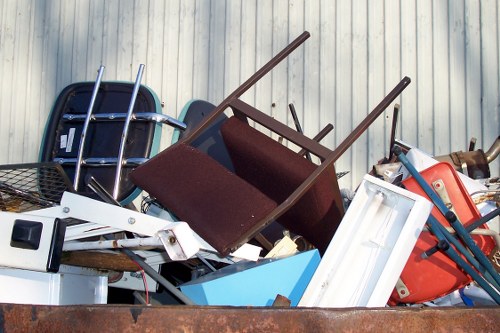Efficient Waste Collection in North West London: A Comprehensive Overview

Introduction to Waste Collection Services
Waste collection is a critical service that ensures the cleanliness and sustainability of communities. In North West London, waste management strategies are designed to cater to diverse residential and commercial needs, promoting environmental responsibility and public health.
The area encompasses a mix of urban and suburban settings, each presenting unique challenges and requirements for effective waste collection. Understanding the systems in place helps residents and businesses contribute to a cleaner environment.
From recycling programs to regular garbage pick-ups, the waste collection services in North West London are structured to provide comprehensive solutions that align with local regulations and environmental standards.

Types of Waste Collected
Residential Waste
Residential waste collection focuses on household waste, including non-recyclable materials, recyclables, and organic waste. Effective segregation at the source is encouraged to facilitate recycling and reduce landfill dependency.
Recyclables
Common recyclables include paper, cardboard, glass, plastics, and metals. Specific guidelines are provided to residents to ensure proper sorting and handling of recyclable materials.
Organic Waste
Organic waste, such as food scraps and garden waste, is collected separately to support composting initiatives. This not only reduces landfill pressure but also supports soil health through compost production.

Commercial Waste Management
Businesses in North West London often generate significant volumes of waste. Tailored waste collection services are available to meet the varying needs of different industries, ensuring efficient and compliant waste disposal.
Services include regular pickups, specialized waste handling for hazardous materials, and consultancy for waste reduction strategies. By partnering with waste collection providers, businesses can enhance their sustainability profiles.
Implementing effective waste management practices not only aligns with environmental goals but can also lead to cost savings through optimized waste handling and recycling programs.

Recycling Initiatives and Programs
Household Recycling Programs
North West London offers robust recycling programs aimed at maximizing the recovery of recyclable materials. These programs are supported by comprehensive public education campaigns to encourage participation.
Collection Points and Facilities
Strategically placed recycling bins and facilities make it convenient for residents to dispose of recyclable materials. Accessibility is a key focus to ensure high participation rates across the community.
Community Engagement
Engaging the community through workshops and informational sessions fosters a culture of recycling and environmental stewardship. Active participation from residents is essential for the success of these initiatives.

Challenges and Solutions
Waste collection in North West London faces several challenges, including increasing waste volumes, contamination in recycling streams, and logistical constraints in densely populated areas.
- Waste Volume Management: Implementing efficient collection schedules and investing in scalable infrastructure.
- Contamination Control: Educating residents on proper sorting techniques to minimize contamination.
- Logistical Efficiency: Utilizing advanced routing software to optimize collection routes and reduce emissions.
Addressing these challenges requires a multifaceted approach, combining policy enforcement, community engagement, and technological advancements to create a sustainable waste management system.
Innovative Technologies in Waste Collection
Adopting innovative technologies can significantly enhance waste collection efficiency. Smart bins equipped with sensors, automated collection vehicles, and data analytics play a pivotal role in modernizing waste management practices.
Smart Bins
Implemented in several areas, smart bins notify collection services when they are full, optimizing pickup schedules and reducing unnecessary trips.
Automated Vehicles
Automated and electric waste collection vehicles contribute to reducing the carbon footprint of waste management operations, aligning with broader environmental goals.
Environmental Impact and Sustainability
Effective waste collection directly impacts the environment by reducing pollution, conserving resources through recycling, and minimizing greenhouse gas emissions from landfills.
- Pollution Reduction: Proper waste disposal prevents contamination of air, water, and soil.
- Resource Conservation: Recycling conserves natural resources and reduces the need for raw material extraction.
- Emission Control: Efficient waste processing limits methane emissions from organic waste decomposition.
Sustainability in waste collection is achieved through continuous improvements in processes, increased recycling rates, and the adoption of eco-friendly technologies.
Community Involvement and Education
Empowering the community through education and involvement is essential for the success of waste collection programs. Awareness campaigns and participatory initiatives foster a sense of responsibility among residents.
Educational Programs
Schools and local organizations collaborate to educate the public on the importance of waste segregation, recycling, and reducing waste generation.
Volunteer Opportunities
Volunteering in local clean-up drives and recycling programs encourages active participation and strengthens community bonds.
Resource Centers
Providing accessible information and resources helps residents understand and adhere to waste collection guidelines, enhancing overall program effectiveness.
Future Trends in Waste Collection
The future of waste collection in North West London is poised to embrace sustainability and innovation. Emerging trends include circular economy practices, increased automation, and enhanced recycling technologies.
- Circular Economy: Emphasizing the reuse and recycling of materials to create a closed-loop system.
- Automation: Implementing advanced robotics and AI to streamline waste sorting and collection processes.
- Advanced Recycling: Investing in technologies that can handle a wider range of materials more efficiently.
These trends promise to make waste collection more efficient, environmentally friendly, and aligned with global sustainability goals.
Conclusion
Waste collection in North West London is a well-structured system that balances efficiency, sustainability, and community involvement. By continuously adapting to new challenges and embracing innovative solutions, the region sets a standard for effective waste management practices.
Residents and businesses play a crucial role in this ecosystem by adhering to waste segregation guidelines, participating in recycling programs, and supporting sustainable initiatives. Together, these efforts contribute to a cleaner, healthier, and more sustainable North West London.
If you're looking to enhance your waste management practices or have specific needs, contact us today to learn more about our comprehensive waste collection services tailored for North West London.
